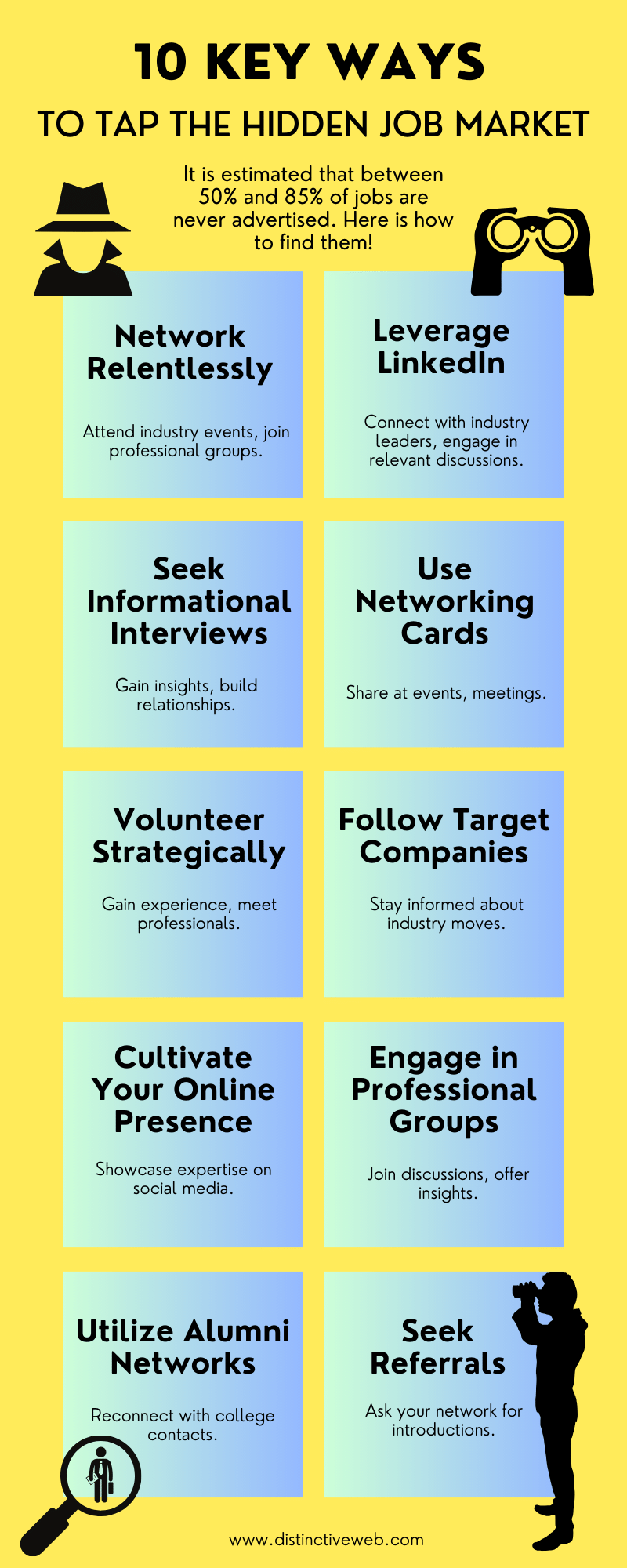
Ever wondered why some people seem to effortlessly land new roles, even in the most competitive industries? The secret may lie in their understanding of the hidden job market. The hidden job market, as its name implies, refers to unadvertised or publicly unlisted job opportunities. A successful job hunt often goes beyond just responding to job ads. It requires an understanding of this covert arena, where opportunities are plentiful but not always apparent.
Key Takeaways
Decoding the Hidden Job Market
You might ask, why would employers choose not to publicize their openings? The reasons vary. Some aim to save money on advertising costs, some favor candidates through employee referrals, and others must replace managers confidentially.
Some companies claim they are not creating new jobs and hiring, and that may be true to a degree. But it doesn’t tell the whole story because they are still hiring. It is just that they are replacing employees rather than adding them. This makes them reluctant to advertise because of the expense and desire to avoid a rush of incoming interest.
Many hiring managers find it more prudent, cost-effective, and efficient to fill jobs through other sources than job listings. Working the hidden job market is faster, more economical, and more effective than enduring a tsunami of resumes.
Regardless of the reasons, this hidden market is a treasure trove of opportunities if you know how to navigate it.
Avoid the Obvious
To access the hidden job market, you do not want to be where everyone else is. Fortify your job search with focused effort. Examples of focused effort include:
Networking is a pivotal strategy in unveiling these concealed job opportunities. Surveys repeatedly reveal that at least 50% of individuals learned about job openings through friends and professional acquaintances. A LinkedIn survey indicated this number is actually much higher, up to 85%. The more connections you make, the more you increase your chances of uncovering these unadvertised positions. Thus, refining your networking skills is key.
Networks circulate around you. In addition to family members, there are your neighbors, church community, volunteer network, association membership, work colleagues, former employers, and the people you supervised in the past. Connect with them all.
Another key strategy is staying abreast of company news and taking the initiative to connect with companies you are interested in. Subscribing to news alerts or following companies of interest on LinkedIn not only helps in discovering hidden opportunities but also signals genuine interest in the company, an important factor for penetrating the hidden job market.

Promoting Yourself for Hidden Opportunities
Your resume plays a crucial role in your job search. Acting as your silent ambassador, it loudly narrates your skills and experiences, an aspect that becomes even more significant in the hidden job market.
Yet, navigating the hidden job market requires a strategic approach to resume writing. Unlike the traditional job search, where you (ideally) tailor your resume for a specific job listing, the hidden job market often involves positioning yourself attractively for opportunities that haven’t been publicly advertised or may not even exist yet. Here’s how you can prepare:
Create a “Master” Resume
A master resume is your foundational document, tailored as precisely as possible to a particular “type” of job and to a particular industry (assuming you are targeting a particular industry) rather than a specific position. It’s a strategic balance between being comprehensive and targeted.
Tailor Your Resume to a Company’s Culture
When you find a specific company you want to work for, tailor your resume to align with its culture and values.
Company culture is a critical factor that employers consider when hiring. By customizing your resume to align with a company’s culture, you can position yourself as a strong fit for the organization. As you write your resume, emphasize achievements that resonate with the company’s mission and integrate industry-specific terms and phrases from the company’s materials.
Craft a Networking Resume
Not a replacement for your longer resume, but a complement to it, a networking resume is a brief, impactful version of your professional story, perfect for sparking interest. You can use it when it doesn’t seem appropriate to hand over your full resume, but you wish to provide a summary of your experience and value proposition as a “teaser” to entice the recipient to want to know more about you.
Get Networking Business Cards Made
Networking business cards are a powerful tool for job seekers venturing into the hidden job market. Unlike traditional business cards, which typically reflect current employment, networking cards are designed to showcase your professional identity, key skills, and career aspirations.
They are particularly useful when you might not have a formal job title, such as when you’re in between jobs or transitioning to a new career. On these cards, you should include your name, contact information, and relevant professional details like your LinkedIn profile, areas of expertise, and a brief, impactful tagline that encapsulates your professional value proposition.
Carrying these cards to industry events, conferences, and even casual meet-ups ensures you’re always prepared to make a meaningful connection. They serve as a tangible reminder of your encounter, making it easier for new contacts to remember you and reach out with potential job opportunities.

Example Networking Card
Networking business cards are a powerful tool for job seekers venturing into the hidden job market.
The Power of Professional Networking
Professional networking is a powerful tool in the job search process, especially when it comes to the hidden job market. Establishing connections with decision-makers within organizations can significantly increase your chances of uncovering unadvertised job positions. This aligns with the globally acknowledged reality that networking is pivotal in unveiling hidden job opportunities.
The most efficient networking techniques for discovering concealed employment prospects and, recommended by career coaches, can help you connect with former colleagues and others who may have insights into opportunities to access the hidden job market.
Your network can also provide referrals to unadvertised jobs and offer recommendations that you wouldn’t find through a job posting. Bear in mind, referrals can markedly boost your prospects of securing a job in the unpublished job market. Therefore, cultivating a well-connected professional network is a strategic move in your job search process.
Join Industry Events and Groups
Participating in industry events and joining professional groups are effective ways to expand your network and discover job listings that may not be available on public job boards. Some examples of these events and groups include:
Online platforms such as vFairs, Eventbrite, Meetup, and Lanyrd are popular choices for events and conferences to be posted online. A career coach can help you locate in-person industry events. Attending these events can lead to connections and conversations that unveil hidden job opportunities.
Each of these events and groups offers unique opportunities to uncover open jobs, build professional relationships, and learn about unadvertised job openings in your desired industry.
Engage in Informational Interviews
Informational interviews are an informal exchange of questions and answers between a job seeker and a professional in a specific industry. They allow you to:
Not to be confused with a formal job interview, informational interviews can provide you with access to hiring managers who offer practical perspectives on particular companies and industry trends.
Conducting a successful informational interview requires enhancing your listening and conversation abilities. Asking insightful questions and leaving a lasting impression is fundamental. These interviews can help you inquire about industry-specific matters and obtain insights from established professionals in the field, potentially uncovering hidden opportunities.
Cultivating Advocates Within Your Network
Building a network of contacts who can vouch for your skills and recommend you when opportunities arise for new role can increase your chances of landing new opportunities. Referrals from reputable individuals within organizations can validate a candidate’s competencies, professional demeanor, and alignment with the company’s culture.
Leveraging LinkedIn for Hidden Opportunities
LinkedIn is an essential platform for job seekers. It allows you to:
An optimized LinkedIn profile, tailor-made for the type of job you are seeking and highlighting your transferable skills, is crucial in drawing recruiters. This platform can also be employed to explore the hidden job market by providing company insights, the opportunity to follow company leaders, and participating in real-time conversations with recruiters.
LinkedIn is especially beneficial for white-collar professionals seeking job opportunities. By leveraging this platform, you can make valuable connections and increase your chances of uncovering hidden job opportunities.

Continuous Learning and Adaptability
Embracing continuous learning and adaptability is vital for sustaining your professional relevance.
Continuous learning can positively impact your adaptability in the job market by enabling you to acquire new skills, stay updated with industry trends, and embrace change with a growth mindset.
Consider too, that attending and engaging in professional development classes, trainings, and workshops provides even more opportunity to build your professional network.
Online learning platforms offer industry-specific courses to help you stay up-to-date with industry changes and make continuous learning convenient.
Summary
In conclusion, understanding the hidden job market and utilizing strategic approaches can significantly enhance your job search process. Networking, informational interviews, optimized LinkedIn profiles, continuous learning, adaptability, and personalized job applications are crucial in uncovering hidden job opportunities.
Remember, the hidden job market is a treasure trove of opportunities waiting to be discovered. By leveraging the strategies discussed in this blog post, you can tap into this market, uncover unadvertised positions, and propel your career forward.
Frequently Asked Questions
What is the hidden job market?
The hidden job market refers to job opportunities that aren’t advertised or posted online. These jobs are often filled through personal connections, networking, or internal company referrals. It’s like a behind-the-scenes way of hiring that relies more on who you know and less on public job listings.
What is the difference between the published job market and the hidden job market?
The published job market is where jobs are openly advertised to the public, like on company websites, job boards, or in newspapers or other publications. The hidden job market, on the other hand, consists of jobs that aren’t publicly advertised. These positions are often filled through personal networks, recommendations, or by promoting existing employees.
What techniques should a job seeker use to access the hidden job market?
To tap into the hidden job market, job seekers should network extensively, build professional relationships, attend industry events, follow company news alerts, and reach out directly to companies they’re interested in. It’s also helpful to have a strong online presence on professional platforms like LinkedIn.
How large is the hidden job market?
The hidden job market is quite substantial. Estimates suggest that around 50% to 85% of jobs are filled this way. This means a significant number of job opportunities are never advertised publicly. This highlights the importance of networking and making connections in your job search.
Why don't employers advertise every open position?
Employers and recruiters may choose not to advertise jobs to save time and resources. Advertising and processing applications can be costly and time-consuming. Employers often prefer hiring through referrals or promoting current employees, which can be more efficient and lead to better hiring matches.
Why bother with the hidden job market? Isn't it easier to apply for jobs posted online?
While applying for jobs online can be straightforward, the hidden job market offers unique opportunities that might be a better fit for your skills and career goals. As they are unadvertised, you would never know about them if you limit yourself to applying to online job postings. These positions are less competitive as they attract fewer applicants, and accessing them often depends on your network and personal connections.
Aren't most unpublished jobs filled by internal candidates?
Many jobs in the hidden job market are indeed filled by internal candidates or people within the company or recruiter’s network. However, not all of them are. Many external candidates successfully secure positions through networking, referrals, and by proactively reaching out to employers.
List three ways you can find jobs in the hidden job market?
To find jobs in the hidden job market, you can utilize networking, conduct informational interviews, and perform online research. These are effective ways to tap into the hidden job market.
Why is networking important for identifying unadvertised jobs?
Networking is important in the hidden job market because it helps you uncover unadvertised job opportunities by connecting with decision-makers in organizations. The more connections you have, the higher your chances of finding hidden positions.









